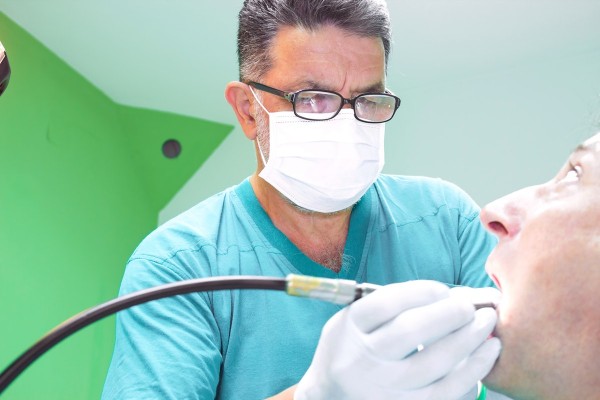There are several reasons why a patient might experience dental implant failure, both in the short term and in the long term. Most short-term failures are due to an inability of the bone to heal. This process is called osseointegration, and there are a number of factors which can contribute to the failure of the healing process.
A patient might have severe diabetes or low bone density, or they may be a persistent smoker. Pre-existing gum disease or poor general oral hygiene can also contribute significantly to inadequate osseointegration. A patient will generally receive some warning signals that dental implant failure has occurred because several symptoms will be apparent.
Some warning signs include the following: the patient may experience significant pain in the jaw area, there could be excessive mobility of the implant, there may be persistent bleeding, and there may also be periodic formations of pus around the implant. When dental implant failure occurs for one of these short-term reasons, the implant will generally be removed. It will then be attempted to repair the surgical site, and then to allow time for a period of healing. After this, a second attempt at installing a dental implant will be made, hopefully with better results.
Long-term implant problems
Long-term implant problems are considerably different than the short-term varieties. Reasons for dental implant failure in the long-term can be more challenging than short-term problems. Generally speaking, long-term problems occur once the implant has healed and is fully integrated with the bone. The most commonly occurring type of long-term failure is called peri-implantitis.
This is a chronic infection which also affects the implant, and it can be compared to how periodontal disease affects teeth. Both of these situations cause a loss of the supporting bone, and both will involve bleeding from the gums, and sometimes the formation of pus pockets. Peri-implantitis is the single most common long-term cause of dental implant failure, and it is also the most difficult to overcome.
Treatments generally involve frequent cleanings, antibiotics, laser therapies, and sometimes surgery to help restore the bone. The overall success rate of dental implant surgery hovers around 98% according to the American Academy of Implant Dentistry. However, the success rate for treating peri-implantitis is much lower than that.
Other causes of long-term dental implant failures can be attributed to mechanical problems such as broken screws, fractured restorations, and sometimes loosening abutments. These are all much easier to deal with than is peri-implantitis, and not surprisingly, the success rate for these kinds of recoveries is much higher.
Lack of education
There is one more reason for dental implant failures which has nothing to do with the patient’s condition or health status. Many dentists in this country who practice oral surgery have had numerous opportunities to restore dental implants. However, relatively fewer dentists have had the opportunity to install original dental implants.
It is known that most dental schools do not include course material which covers the surgical practice of installing dental implants. Most oral surgeons who desire to specialize in dental implant surgery must do so on a continuing education basis. That means they have to specifically seek out a program which will instruct them in the methods and techniques necessary for dental implant surgery.
This is not to suggest that there are oral surgeons who lack the capabilities of performing dental implants. It merely recognizes the situation which exists in dental education, wherein future dentists receive inadequate instruction about the processes necessary for performing dental implant surgery.
Dental Implants at Good Samaritan Dental Implant Institute
One of the best facilities in the country for having your dental implants done is at the Good Samaritan Dental Implant Institute in West Palm Beach, FL. Dr. Andrew Slavin specializes in dental implants, and you can be sure that your oral surgery will be performed by one of the foremost practitioners in the U.S. Contact Dr. Slavin at the Institute today, and schedule a consultation about having dental implant surgery.

